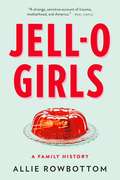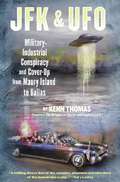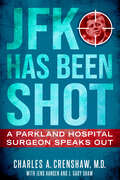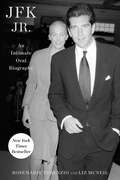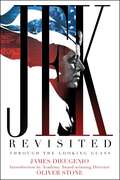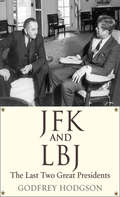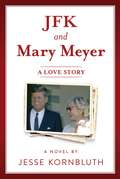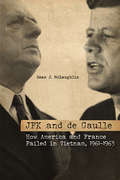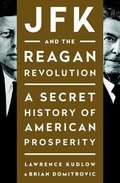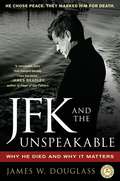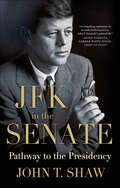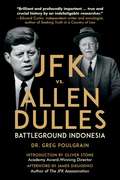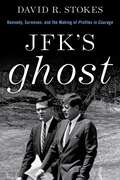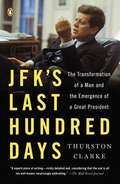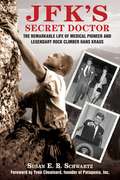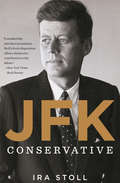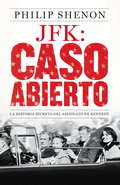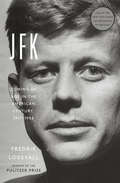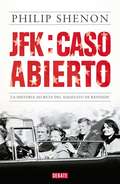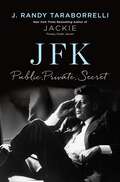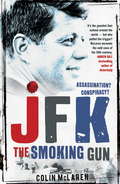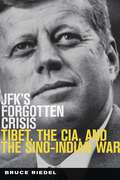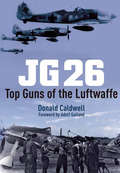- Table View
- List View
JELL-O Girls: A Family History
by Allie RowbottomA "gorgeous" (New York Times) memoir that braids the evolution of one of America's most iconic branding campaigns with the stirring tales of the women who lived behind its facade - told by the inheritor of their stories. <P><P>In 1899, Allie Rowbottom's great-great-great-uncle bought the patent to Jell-O from its inventor for $450. The sale would turn out to be one of the most profitable business deals in American history, and the generations that followed enjoyed immense privilege - but they were also haunted by suicides, cancer, alcoholism, and mysterious ailments. More than 100 years after that deal was struck, Allie's mother Mary was diagnosed with the same incurable cancer, a disease that had also claimed her own mother's life. <P><P>Determined to combat what she had come to consider the "Jell-O curse" and her looming mortality, Mary began obsessively researching her family's past, determined to understand the origins of her illness and the impact on her life of Jell-O and the traditional American values the company championed. Before she died in 2015, Mary began to send Allie boxes of her research and notes, in the hope that her daughter might write what she could not. JELL-O GIRLS is the liberation of that story. <P><P>A gripping examination of the dark side of an iconic American product and a moving portrait of the women who lived in the shadow of its fractured fortune, JELL-O GIRLS is a family history, a feminist history, and a story of motherhood, love and loss. In crystalline prose Rowbottom considers the roots of trauma not only in her own family, but in the American psyche as well, ultimately weaving a story that is deeply personal, as well as deeply connected to the collective female experience.
JFK & UFO
by Kenn ThomasIn 1947 six flying saucers circled above a harbor boat in Puget Sound near Tacoma, Washington, one wobbling and spewing slag. The falling junk killed a dog and burned a boy's arm. His father, Harold Dahl, witnessed it all and brought his partner, Fred Crisman, down the next day to see yet another UFO. The Maury Island incident became the first UFO event of the modern era. In 1968 New Orleans district attorney Jim Garrison subpoenaed Fred Crisman as part of his investigation into the JFK assassination, which became the subject of Oliver Stone's 1992 movie JFK. Garrison believed that Crisman was the infamous grassy knoll shooter. He's also the central figure in the "Mystery Tramp" photo of the Dallas rail yard hobos. Illustrated with rare images, JFK & UFO interconnects the lingering mysteries of America's most notorious assassination and its weird ufological subculture. It examines the denizens of the bizarre, semi-spook underground reflecting a stranger and more true history than offered by the mainstream.
JFK Has Been Shot
by Charles A. Crenshaw Jens Hansen J. Gary ShawThe &“thrilling, dramatic, historic&” #1 New York Times bestseller by the Parkland Hospital surgeon who fought to save President John F. Kennedy (Robert K. Tanenbaum). On November 22, 1963, Dr. Charles Crenshaw, an accomplished surgeon, tried to save John F. Kennedy&’s life—and then days later, the life of the alleged assassin, Lee Harvey Oswald. His gripping, firsthand account contradicts the Warren Commission and years of public misperception to illuminate a chapter in American history long cloaked in conspiracy. Writing with eye-opening immediacy, Dr. Crenshaw takes readers into the emergency room to share the critical events at Parkland Hospital as he lived them. Now updated, his searing testimony punctures myths and shatters a cover-up of massive proportions. &“Hard-hitting, courageous, and correct in every respect.&”—Cyril Wecht, M.D., J.D. "Dr. Crenshaw offers his expert opinion with persuasive evidence. Read this page-turning account of the Kennedy assassination.&”—Robert K. Tanenbaum, Deputy Chief Counsel, Congressional Committee Investigation into the Assassination of President KennedyIncludes revealing photos Previously published as JFK Conspiracy of Silence
JFK Jr.: An Intimate Oral Biography
by RoseMarie Terenzio Liz McNeilThe first oral biography of John F. Kennedy Jr. is an extraordinarily intimate, comprehensive look at the real man behind the myth. Sharing never-before-told stories and insights, his closest friends, confidantes, lovers, classmates, teachers, and colleagues paint a vivid portrait of one of the most beloved figures of the 20th century, revealing how the boy who saluted became the man America came to know and love who still captures public imagination twenty-five years after his tragic death. <P><P> Born into the spotlight, John F. Kennedy Jr. lived a short but remarkable life filled with expectation, ambition, family pressures, love, and tragedy. JFK Jr. dives deep into his complicated psyche and explores the what-ifs, illuminating both the cultural and political moment he inhabited and the way this son of a president, so full of promise and possibility, embodied America’s most cherished hopes. <p> <b>New York Times Bestseller</b>
JFK Revisited: Through the Looking Glass
by James DiEugenioBased on Oliver Stone's documentary, JFK Revisited, read the transcripts and interviews that will change the way you think about the John F. Kennedy assassination.JFK Revisited: Through the Looking Glass contains the two working original screenplays for Oliver Stone&’s JFK Revisited; both the two-hour version, Through the Looking Glass, and the four-hour version, Destiny Betrayed. These films are the first documentaries to feature the work of the Assassination Records Review Board. The Assassination Records Review Board worked from 1994–98 releasing records that the government has classified in whole or in part on the assassination of President John F. Kennedy. They ended up releasing about two million pages or approximately sixty thousand documents. They also pursued an investigation into the autopsy and medical evidence in the JFK case. Although their releases and discoveries were quite important to the evidentiary record, they received very little exposure in the mainstream media. They also released documents relating to Kennedy&’s foreign policy in both Cuba and Vietnam. In the former case, these were plans by the Pentagon to create a pretext to invade Cuba. In the latter, documents proved Kennedy was implementing a withdrawal plan from Vietnam. This book is unprecedented. It contains a compendium of information originating from the widest range of authorities on the JFK case ever assembled. This includes luminaries from several fields: pathology, surgery, ballistics, criminal investigation, neurology, history, and journalism. Never before have people like forensic pathologist Cyril Wecht, criminalist Henry Lee, Professor James Galbraith, author David Talbot, journalist Jefferson Morley, intelligence analyst John Newman, Professor Robert Rakove, and more appeared in one book; never have this many illustrious authorities been interviewed about their views on the policies and the assassination of President John F. Kennedy. The book also includes important witness interviews with Dr. Donald Miller about his colleague Malcolm Perry, Jim Gochenaur of the Church Committee, and Edwin McGehee of both the House Select Committee on Assassinations and the Jim Garrison investigation. The combination of this newly released information plus expert interviews changed the database and calculus of the JFK case. The scripts are included in this book, which were the backbone for Oliver Stone's films. It also includes important excerpts from the many interviews which did not make it into the final cuts of the films. JFK Revisited will challenge everything you thought you know about the JFK assassination.
JFK and LBJ
by Godfrey HodgsonAs a young White House correspondent during the Kennedy and Johnson years in Washington, D. C. , Godfrey Hodgson had a ringside seat covering the last two great presidents of the United States, John F. Kennedy and Lyndon B. Johnson, two men who could not have been more different. Kennedy's wit and dashing style, his renown as a national war hero, and his Ivy League Boston Brahmin background stood in sharp contrast to Lyndon Johnson's rural, humble origins in Texas, his blunt, forceful (but effective) political style, his lackluster career in the navy, and his grassroots populist instincts. Hodgson, a sharp-eyed witness throughout the tenure of these two great men, now offers us a new perspective enriched by his reflections since that time a half-century ago. He offers us a fresh, dispassionate contrast of these two great men by stripping away the myths to assess their achievements, ultimately asking whether Johnson has been misjudged. He suggests that LBJ be given his due by history, arguing that he was as great a president as, perhaps even greater than, JFK. The seed that grew into this book was the author's early perception that JFK's performance in office was largely overrated while LBJ's was consistently underrated. Hodgson asks key questions: If Kennedy had lived, would he have matched Johnson's ambitious Great Society achievements? Would he have avoided Johnson's disastrous commitment in Vietnam? Would Nixon have been elected his successor, and if not, how would American politics and parties look today? Hodgson combines lively anecdotes with sober analyses to arrive at new conclusions about the U. S. presidency and two of the most charismatic figures ever to govern from the Oval Office.
JFK and LBJ: The Influence of Personality Upon Politics
by Tom WickerAnalysis based on Kennedy and Johnson and their background.
JFK and Mary Meyer: A Love Story
by Jesse KornbluthMary Pinchot Meyer was possibly the only woman John F. Kennedy ever loved. Follow their affair in this fictional diary of the woman murdered for asking too many questions after the JFK assassination. John F. Kennedy said he needed sex every three days or he got a headache. In the White House, he never had a headache. Kennedy met Mary Pinchot in 1935, when he was eighteen and she was sixteen. Twenty years later, when she was living in Virginia and married to Cord Meyer, a high-ranking CIA official, she was Jack and Jackie Kennedy&’s next-door neighbor. In 1962, she was an artist, divorced, living in Washington—and Kennedy&’s first serious romance. Mary Pinchot Meyer was more than a bedmate. She was Kennedy&’s beacon light: his sole female adviser, spending mornings in the Oval Office, and, at night, discussing issues. After the 1964 election, Kennedy said, he would divorce Jackie and marry her. After the assassination, Mary didn&’t believe Lee Harvey Oswald acted alone, and she shared that view, loudly and often, in Washington&’s most elite circles. Her ex-husband urged her to be silent, but when the report of the Warren Commission was released, she was even more loudly critical. On October 10, 1964, two days before her forty-forth birthday, as she walked in Georgetown, a man shot her in the head and the heart. That night, Mary's best friend called her sister. &“Mary had a diary,&” she said. &“Get it.&” The diary was filled with sketches, notes for paintings—and ten pages about an affair with an unnamed lover. Her sister burned it. In JFK and Mary Meyer: A Love Story, Jesse Kornbluth recreates the diary Mary might have written. Working from a timeline of Kennedy&’s presidency and every documented account of their public relationship, he has written a high-octane thriller that tracks this secret, doomed romance—and invites readers to solve Mary&’s murder.
JFK and de Gaulle: How America and France Failed in Vietnam, 1961–1963 (Studies in Conflict, Diplomacy, and Peace)
by Sean J. McLaughlin“America’s road to disaster in Vietnam has been endlessly chronicled, but Sean L. McLaughlin takes a fresh approach to that familiar story.” —James Hershberg, George Washington UniversityDespite French President Charles de Gaulle’s persistent efforts to constructively share French experience and use his resources to help engineer an American exit from Vietnam, the Kennedy administration responded to de Gaulle’s peace initiatives with bitter silence and inaction.The administration’s response ignited a series of events that dealt a massive blow to American prestige across the globe, resulting in the deaths of over fifty-eight thousand American soldiers and turning hundreds of thousands of Vietnamese citizens into refugees.This history of Franco-American relations during the Kennedy presidency explores how and why France and the US disagreed over the proper western strategy for the Vietnam War. France clearly had more direct political experience in Vietnam, but France’s postwar decolonization cemented Kennedy’s perception that the French were characterized by a toxic mixture of shortsightedness, stubbornness, and indifference to the collective interests of the West.At no point did the Kennedy administration give serious consideration to de Gaulle’s proposals or entertain the notion of using his services as an honest broker in order to disengage from a situation that was rapidly spiraling out of control. Kennedy’s Francophobia, the roots of which appear in a selection of private writings from Kennedy’s undergraduate years at Harvard, biased his decision-making. This book explores how the course of action Kennedy chose in 1963, a rejection of the French peace program, all but handcuffed Lyndon Johnson into formally entering a war he knew the United States had little chance of winning.
JFK and the Reagan Revolution: A Secret History of American Prosperity
by Lawrence Kudlow Brian DomitrovicThe fascinating, suppressed history of how JFK pioneered supply-side economics. John F. Kennedy was the first president since the 1920s to slash tax rates across-the-board, becoming one of the earliest supply-siders. Sadly, today's Democrats have ignored JFK's tax-cut legacy and have opted instead for an anti-growth, tax-hiking redistribution program, undermining America's economy. One person who followed JFK's tax-cut growth model was Ronald Reagan. This is the never-before-told story of the link between JFK and Ronald Reagan. This is the secret history of American prosperity. JFK realized that high taxes that punished success and fanned class warfare harmed the economy. In the 1950s, when high tax rates prevailed, America endured recessions every two or three years and the ranks of the unemployed swelled. Only in the 1960s did an uninterrupted boom at a high rate of growth (averaging 5 percent per year) drive a tremendous increase in jobs for the long term. The difference was Kennedy's economic policy, particularly his push for sweeping tax-rate cuts. Kennedy was so successful in the '60s that he directly inspired Ronald Reagan's tax cut revolution in the 1980s, which rejuvenated the economy and gave us another boom that lasted for two decades. Lawrence Kudlow and Brian Domitrovic reveal the secret history of American prosperity by exploring the little-known battles within the Kennedy administration. They show why JFK rejected the advice of his Keynesian advisors, turning instead to the ideas proposed by the non-Keynesians on his team of rivals. We meet a fascinating cast of characters, especially Treasury Secretary Douglas Dillon, a Republican. Dillon's opponents, such as liberal economists Paul Samuelson, James Tobin, and Walter Heller, fought to maintain the high tax rates--including an astonishing 91% top rate--that were smothering the economy. In a wrenching struggle for the mind of the president, Dillon convinced JFK of the long-term dangers of nosebleed income-tax rates, big spending, and loose money. Ultimately, JFK chose Dillon's tax cuts and sound-dollar policies and rejected Samuelson and Heller. In response to Kennedy's revolutionary tax cut, the economy soared. But as the 1960s wore on, the departed president's priorities were undone by the government-expanding and tax-hiking mistakes of Presidents Johnson, Nixon, Ford, and Carter. The resulting recessions and the "stagflation" of the 1970s took the nation off its natural course of growth and prosperity-- until JFK's true heirs returned to the White House in the Reagan era. Kudlow and Domitrovic make a convincing case that the solutions needed to solve the long economic stagnation of the early twenty-first century are once again the free-market principles of limited government, low tax rates, and a strong dollar. We simply need to embrace the bipartisan wisdom of two great presidents, unleash prosperity, and recover the greatness of America.From the Hardcover edition.
JFK and the Unspeakable: Why He Died and Why It Matters
by James W. DouglassThe acclaimed book Oliver Stone called "the best account I have read of this tragedy and its significance,"JFK and the Unspeakable details not just how the conspiracy to assassinate President John F. Kennedy was carried out, but WHY it was done...and why it still matters today. At the height of the Cold War, JFK risked committing the greatest crime in human history: starting a nuclear war. Horrified by the specter of nuclear annihilation, Kennedy gradually turned away from his long-held Cold Warrior beliefs and toward a policy of lasting peace. But to the military and intelligence agencies in the United States, who were committed to winning the Cold War at any cost, Kennedy's change of heart was a direct threat to their power and influence. Once these dark "Unspeakable" forces recognized that Kennedy's interests were in direct opposition to their own, they tagged him as a dangerous traitor, plotted his assassination, and orchestrated the subsequent cover-up. Douglass takes readers into the Oval Office during the tense days of the Cuban Missile Crisis, along on the strange journey of Lee Harvey Oswald and his shadowy handlers, and to the winding road in Dallas where an ambush awaited the President's motorcade. As Douglass convincingly documents, at every step along the way these forces of the Unspeakable were present, moving people like pawns on a chessboard to promote a dangerous and deadly agenda. JFK and the Unspeakable shot up to the top of the bestseller charts when Oliver Stone first brought it to the world's attention on Bill Maher's show. Since then, it has been lauded by Mark Lane (author of Rush to Judgment, who calls it "an exciting work with the drama of a first-rate thriller"), John Perkins (author of Confessions of an Economic Hit Man, who proclaims it is "arguably the most important book yet written about an American president), and Robert F. Kennedy, Jr. , who calls it "a very well-documented and convincing portrait...I urge all Americans to read this book and come to their own conclusions. "
JFK in the Senate: Pathway to Presidency
by John T. ShawBefore John F. Kennedy became a legendary young president he was the junior senator from Massachusetts. The Senate was where JFK's presidential ambitions were born and first realized. In the first book to deal exclusively with JFK's Senate years, author John T. Shaw looks at how the young Senator was able to catapult himself on the national stage. Tip O'Neill once quipped that Kennedy received more publicity for less accomplishment than anyone in Congress. But O'Neill didn't understand that Kennedy saw a different path to congressional influence and ultimately the presidency. Unlike Lyndon Johnson, the Democratic leader in the Senate, JFK never aspired to be "The Master of the Senate" who made deals and kept the institution under his control. Instead, he envisioned himself as a "Historian-Scholar-Statesman" in the mold of his hero Winston Churchill which he realized with the 1957 publication of Profiles of Courage that earned JFK a Pulitzer Prize and public limelight. Smart, dashing, irreverent and literary, the press could not get enough of him. Yet, largely overlooked has been Kennedy's tenure on a special Senate committee to identify the five greatest senators in American history—JFK's work on this special panel coalesced his relationships in Congress, and helped catapult him toward the presidency. Based on primary documents from JFK's Senate years as well as memoirs, oral histories, and interviews with his top aides, JFK in the Senate provides new insight into an underappreciated aspect of his political career.
JFK vs. Allen Dulles: Battleground Indonesia
by Greg PoulgrainFor fans of conspiracy theories and JFK assassination theories, the untold story of Indonesia, gold, JFK, Allen Dulles, the CIA, and secret military coups. Two of the most fascinating figures in history, John F. Kennedy, thirty-fifth president of the United States, and Allen Dulles, our nation&’s longest-serving CIA director, often clashed over intelligence issues and national security. However, one such conflict has remained in the shadows until now. JFK vs. Allen Dulles: Battleground Indonesia takes reader to the vast archipelago 3350 miles wide where this secret showdown occurred. In 1936, an Allen Dulles-established company discovered the world's largest gold deposit in remote Netherlands New Guinea. In 1962, President Kennedy intervened, and Netherlands New Guinea was added to President Sukarno's Indonesia. Neither Sukarno nor JFK was aware of the gold, since Dulles had not informed Kennedy. Dulles planned a complicated and ruthless CIA regime-change strategy to seize control not only of Indonesia itself, but also of its vast resources, including the gold. This strategy included a push to start Malaysian Confrontation. Yet Kennedy's plan to visit Jakarta in early 1964 would have sunk Dulles' master plan, which included the destruction of the Indonesian communist party as a wedge to split Moscow and Beijing. Only an assassin's bullet put an end to Kennedy&’s plan of peace. Did Allen Dulles arrange for JFK to be killed to save his plan and his gold? Was his coup for gold successful with JFK out of the picture? Using archival records as a basis, Greg Poulgrain adds word-of-mouth evidence from those people who were directly involved—such as Dean Rusk and others who worked with President Kennedy and Allen Dulles at the time; or the person who was with Michael Rockefeller when he mysteriously disappeared in West New Guinea during this whole affair.
JFK's Ghost: Kennedy, Sorensen and the Making of Profiles in Courage
by David R. Stokes&“I&’d rather win a Pulitzer Prize than be President of the United States,&” John F. Kennedy confided to author Margaret Coit shortly after his election to the Senate in 1953. Kennedy got his wish four years later, when his book Profiles in Courage was awarded the Pulitzer for biography—even though it wasn&’t among the finalists for the prize. Furthermore, the role of Ted Sorensen in drafting the main chapters in the book was never acknowledged by Kennedy&’s inner circle, and Kennedy himself was hyper-sensitive until his dying day about rumors that cast doubt on his ownership of Profiles in Courage. Still, Jack Kennedy the writer is part of the Kennedy narrative that helped propel his political career. And he did indeed work for a time as a journalist, and brought a measures of erudition, wit, and charm to his speeches. But if the rumors surrounding authorship of Profiles in Courage were proven to be true prior to his ascendance to the Presidency, there might have been no brief and shining moment in America called Camelot.
JFK's Last Hundred Days
by Thurston ClarkeThurston Clarke's gripping account of the last months of the life of President John F. Kennedy weaves together his public and private life and addresses the most tantalizing mystery of all - not who killed him but who he was when he was killed, and where he would have led his country and the world. This re-examination of a critical period looks at all the areas of the president's fascinating life: the progress he made towards ending the Cold War, passing the Civil Rights Act and withdrawing US troops from Vietnam, as well as his grief at the death of his infant son Patrick, his ongoing battle with ill health and his renewed determination to be a good husband and father. The resulting portrait reveals the essence of this charismatic man, his personal transformation and the emergence of a great president. It also explains the widespread and enduring grief following his assassination, mourning the loss of his remarkable promise, which had become increasingly evident during his last hundred days. Thurston Clarke has written eleven widely acclaimed works of fiction and nonfiction on travel and modern history including Ask Not: The Inauguration of John F. Kennedy and the Speech That Changed America. His articles have appeared in Vanity Fair, The New York Times, The Washington Post and many other publications. 'His enthusiasm is infectious . . . he entertains and illuminates, writing gracefully, and with a fine sense of irony . . . He's funny and he's fair and he swims well against powerful cultural cross-currents' New York Times Book Review
JFK's Last Hundred Days
by Thurston ClarkeA revelatory, minute-by-minute account of JFK's final days that asks what might have been Fifty years after his assassination, President John F. Kennedy's legend endures. Noted author and historian Thurston Clarke reexamines the last months of the president's life to show a man in the midst of great change, both in his family and in the key issues of his day: the cold war, civil rights, and Vietnam, finally on the cusp of making good on his extraordinary promise. JFK's Last Hundred Days presents a gripping account that weaves together Kennedy's public and private lives, explains why the grief following his assassination has endured so long, and solves the most tantalizing Kennedy mystery of them all--not who killed him but who he was when he was killed and where he would have led us. e is ample evidence that he suspended his notorious philandering during these last months of his life. Also in these months Kennedy finally came to view civil rights as a moral as well as a political issue, and after the March on Washington, he appreciated the power of Reverend Martin Luther King, Jr., for the first time. Though he is often depicted as a devout cold warrior, Kennedy pushed through his proudest legislative achievement in this period, the Limited Test Ban Treaty. This success, combined with his warming relations with Nikita Khrushchev in the wake of the Cuban missile crisis, led to a détente that British foreign secretary Sir Alec Douglas- Home hailed as the "beginning of the end of the Cold War." Throughout his presidency, Kennedy challenged demands from his advisers and the Pentagon to escalate America's involvement in Vietnam. Kennedy began a reappraisal in the last hundred days that would have led to the withdrawal of all sixteen thousand U.S. military advisers by 1965. JFK's Last Hundred Days is a gripping account that weaves together Kennedy's public and private lives, explains why the grief following his assassination has endured so long, and solves the most tantalizing Kennedy mystery of all--not who killed him but who he was when he was killed, and where he would have led us.
JFK's Secret Doctor: The Remarkable Life of Medical Pioneer and Legendary Rock Climber Hans Kraus
by Yvon Chouinard Susan E.B. SchwartzJFK's Secret Doctor tells a thrilling story of adventure and a historic medical career. Set against the grand panorama of twentieth century world events, it captures the remarkable life and spirit of climber and medical visionary Hans Kraus (1905-1996). Kraus was taught English by writer James Joyce, escaped Nazi-dominated Europe, and was JFK's secret back specialist. A legendary rock climber, known for hair-raising ascents on two continents, Kraus lived a life full of triumph, tragedy, intensity, verve, and a whole lot of guts, glory, and wit. Few realized that the same man, considered one of the great unsung medical pioneers of the twentieth century, was also making headline news throughout the second half of the 1950s, was a guest of honor at Eisenhower's White House, and the cover story of major magazines throughout America, including Sports Illustrated. His pioneering work in muscles and fitness uncovered shocking truths about the health of American children, and his work curing back pain brought him into the Kennedy White House and inner circle of Camelot.Here is the life of Hans Kraus, including the previously untold story of Kennedy's debilitating back problems, including Kennedy's White House medical records and first-time interviews with two Kennedy White House doctors.
JFK, Conservative
by Ira StollIn an era of partisanship and shifting political labels, a fascinating look at just how &“liberal&” President John F. Kennedy actually was—or wasn&’t. &“America, meet the real John F. Kennedy.&” —Washington Times John F. Kennedy is lionized by liberals. He inspired Lyndon Johnson to push Congress to pass the Civil Rights Act. His New Frontier promised increased spending on education and medical care for the elderly. He inspired Bill Clinton to go into politics. His champions insist he would have done great liberal things had he not been killed by Lee Harvey Oswald. But what if we've been looking at him all wrong? Indeed, JFK had more in common with Ronald Reagan than with LBJ. After all, JFK's two great causes were anticommunism and tax cuts. His tax cuts, domestic spending restraint, military buildup, pro-growth economic policy, emphasis on free trade and a strong dollar, and foreign policy driven by the idea that America had a God-given mission to defend freedom—all make him, by the standards of both his time and our own, a conservative. This widely debated book is must reading for conservatives and liberals alike. &“Provocative and compelling . . . Ira Stoll has succeeded in changing our very perception of Kennedy as one of liberalism's heroes."—Weekly Standard &“An informative analysis of the ways in which JFK did indeed evince his conservative side—he was very religious, open to a free market unencumbered by governmental interference, and staunchly anti-Communist.&” —Publishers Weekly
JFK: Caso abierto
by Philip ShenonLa explosiva crónica del asesinato de John F. Kennedy que obligará a reescribir la historia del magnicidio más famoso del siglo veinte. Una tarde de la primavera de 2008, sonó el teléfono de Philip Shenon en la delegación de The New York Times en Washington. Quien llamaba era un importante abogado que había empezado su carrera hacía casi medio siglo como miembro de la Comisión Warren que investigó el asesinato de Kennedy. "Cuenta nuestra historia", dijo. "No somos jóvenes, pero muchos de los miembros de la comisión seguimos vivos, y esta puede ser nuestra última oportunidad para contar lo que realmente ocurrió". Así empezó un trabajo de cinco años para reconstruir la historia oculta de la investigación más importante y más controvertida del siglo veinte. El libro pronto se convirtió en algo mucho mayor: Shenon descubrió que gran parte de la verdad sobre el asesinato del presidente todavía no había sido contada, y que muchas pruebas habían sido escondidas o destruidas por la CIA, el FBI y otras personas que ocupaban lugares de poder en Washington. En el tenso y absorbente libro de Shenon aparecen las figuras legendarias que protagonizaron esa época: Robert Kennedy, Jacqueline Kennedy, Lyndon B. Johnson y J. Edgar Hoover. A partir de cientos de entrevistas y un acceso sin precedentes a los miembros supervivientes de la Comisión Warren y a otros protagonistas, el sólido y definitivo libro de Philip Shenon cambiará la idea que tenemos del asesinato de John F. Kennedy y de la fallida investigación que le siguió.From the Trade Paperback edition.
JFK: Coming of Age in the American Century, 1917-1956 (G - Reference, Information And Interdisciplinary Subjects Ser.)
by Fredrik LogevallA Pulitzer Prize–winning historian takes us as close as we have ever been to the real John F. Kennedy in this revelatory biography of the iconic, yet still elusive, thirty-fifth president. &“An utterly incandescent study of one of the most consequential figures of the twentieth century.&”—Jill Lepore, author of These Truths: A History of the United StatesBy the time of his assassination in 1963, John F. Kennedy stood at the helm of the greatest power the world had ever seen, a booming American nation that he had steered through some of the most perilous diplomatic standoffs of the Cold War. Born in 1917 to a striving Irish American family that had become among Boston&’s wealthiest, Kennedy knew political ambition from an early age, and his meteoric rise to become the youngest elected president cemented his status as one of the most mythologized figures in American history. And while hagiographic portrayals of his dazzling charisma, reports of his extramarital affairs, and disagreements over his political legacy have come and gone in the decades since his untimely death, these accounts all fail to capture the full person.Beckoned by this gap in our historical knowledge, Fredrik Logevall has spent much of the last decade searching for the &“real&” JFK. The result of this prodigious effort is a sweeping two-volume biography that properly contextualizes Kennedy amidst the roiling American Century. This volume spans the first thirty-nine years of JFK&’s life—from birth through his decision to run for president—to reveal his early relationships, his formative experiences during World War II, his ideas, his writings, his political aspirations. In examining these pre–White House years, Logevall shows us a more serious, independently minded Kennedy than we&’ve previously known, whose distinct international sensibility would prepare him to enter national politics at a critical moment in modern U.S. history. Along the way, Logevall tells the parallel story of America&’s midcentury rise. As Kennedy comes of age, we see the charged debate between isolationists and interventionists in the years before Pearl Harbor; the tumult of the Second World War, through which the United States emerged as a global colossus; the outbreak and spread of the Cold War; the domestic politics of anti-Communism and the attendant scourge of McCarthyism; the growth of television&’s influence on politics; and more. JFK: Coming of Age in the American Century, 1917–1956 is a sweeping history of the United States in the middle decades of the twentieth century, as well as the clearest portrait we have of this enigmatic American icon.
JFK: La historia secreta del asesinato de Kennedy (Vintage Espanol Ser.)
by Philip ShenonLa explosiva crOnica del asesinato de John F. Kennedy que obligarA a reescribir la historia del magnicidio mAs famoso del siglo veinte. Una tarde de la primavera de 2008, sonO el telEfono de Philip Shenon en la delegaciOn de "The New York Times" en Washington. Quien llamaba era un importante abogado que habIa empezado su carrera hacIa casi medio siglo como miembro de la ComisiOn Warren que investigO el asesinato de Kennedy. "Cuenta nuestra historia," dijo. "No somos jOvenes, pero muchos de los miembros de la comisiOn seguimos vivos, y esta puede ser nuestra Ultima oportunidad para contar lo que realmente ocurriO. " AsI empezO un trabajo de cinco aNos para reconstruir la historia oculta de la investigaciOn mAs importante y mAs controvertida del siglo veinte. El libro pronto se convirtiO en algo mucho mayor: Shenon descubriO que gran parte de la verdad sobre el asesinato del presidente todavIa no habIa sido contada, y que muchas pruebas habIan sido escondidas o destruidas por la CIA, el FBI y otras personas que ocupaban lugares de poder en Washington. En el tenso y absorbente libro de Shenon aparecen las figuras legendarias que protagonizaron esa Epoca: Robert Kennedy, Jacqueline Kennedy, Lyndon B. Johnson y J. Edgar Hoover. A partir de cientos de entrevistas y un acceso sin precedentes a los miembros supervivientes de la ComisiOn Warren y a otros protagonistas, el sOlido y definitivo libro de Philip Shenon cambiarA la idea que tenemos del asesinato de John F. Kennedy y de la fallida investigaciOn que le siguiO. "From the Trade Paperback edition. "
JFK: Public, Private, Secret
by J. Randy TaraborrelliTHE INSTANT NEW YORK TIMES BESTSELLERNAMED ONE OF AMAZON EDITORS' BEST BOOKS OF JULYFrom the New York Times bestselling Kennedy historian and author of Jackie: Public, Private, Secret comes the other side of the story—her husband’s: JFK: Public, Private, Secret. In this definitive portrait of John Fitzgerald Kennedy—one of America’s most consequential and enigmatic presidents—J. Randy Taraborrelli delivers a deeply researched and authoritative biography. More than the story of a presidency, this is an intimate study of a man whose public triumphs were shaped—and at times overshadowed—by the complex realities of his private life, from his legendary family to his marriage to Jacqueline Kennedy. Drawing from hundreds of interviews conducted over twenty-five years—as well as candid, first-hand oral histories from the John Fitzgerald Kennedy Presidential Library, rare internal reports from the Secret Service, detailed files from the National Archives, and intelligence documents from both the CIA and FBI. This is JFK as never before captured by history: brilliant yet fallible, revered yet human—a figure whose legacy continues to shape America and the world. Groundbreaking Revelations Include:• A marriage defined by both devotion and distance—and Jackie’s quiet but firm rules regarding her husband’s infidelities. • The romance that posed a potential national security risk—JFK’s deep connection with Inga Arvad, a woman he considered his great love, brought to an abrupt end due to FBI concerns over her ties to Nazi intelligence. • The long-awaited truth about Marilyn Monroe—uncovered at last through the firsthand account of one of her closest confidantes, shattering decades of speculation and exposing the reality of her deeply complicated connection to JFK. • The woman who might have changed history—Joan Lundberg, the mistress JFK turned to during the darkest time in his marriage, whose clandestine relationship with him threatened to derail his entire political career. • The Mafia’s role in his rise to power—a definitive account that separates fact from fiction and lays bare the extent of organized crime’s involvement in JFK’s election. • A presidency tested by betrayal and crisis—why JFK felt undermined by his own cabinet during the Bay of Pigs fiasco, and how he ultimately seized control of his administration during the Cuban Missile Crisis. The JFK presented in Taraborrelli’s definitive biography is a complex and endlessly fascinating historical figure—despite, and perhaps even because of, his many flaws.
JFK: The Smoking Gun
by Colin McLarenAssassination? Conspiracy? Evidence of the shocking truth is finally revealed.'Shocking new details' - Herald SunOn 22nd November 1963, the 35th president of the United States, John Fitzgerald Kennedy, and his wife Jackie were taking part in a presidential motorcade through Dallas. Thousands lined the streets cheering; others hung out of windows to catch a glimpse of the much-loved First Lady and President. Suddenly, the unthinkable: three shots - bang...bang, bang - rang out. In front of the world, John F Kennedy was fatally wounded. Lee Harvey Oswald was caught. But did he fire the fatal bullet?Who REALLY killed JFK?Fifty years after the tragic events in Dallas, JFK: The Smoking Gun solves the ultimate cold case. With the forensic eye of a highly regarded ex-cop, Colin McLaren gathered the evidence, studied 10,000 pages of transcripts, discovered the witnesses the Warren Commission failed to call, and uncovered the exhibits and testimonies that were hidden until now. What he found is far more outrageous than any fanciful conspiracy theory could ever be.JFK: The Smoking Gun proves, once and for all, who did kill the President.'A compelling case' - The Australian'Comprehensive and compelling' - Newcastle Herald
JFKs Forgotten Crisis: Tibet, the CIA, and Sino-Indian War
by Bruce RiedelBruce Riedel provides new perspective and insights into Kennedy's forgotten crisis in the most dangerous days of the cold war. The Cuban Missile Crisis defined the presidency of John F. Kennedy. But during the same week that the world stood transfixed by the possibility of nuclear war between the United States and the Soviet Union, Kennedy was also consumed by a war that has escaped history's attention, yet still significantly reverberates today: the Sino-Indian conflict. As well-armed troops from the People's Republic of China surged into Indian-held territory in October 1962, Kennedy ordered an emergency airlift of supplies to the Indian army. He engaged in diplomatic talks that kept the neighboring Pakistanis out of the fighting. The conflict came to an end with a unilateral Chinese cease-fire, relieving Kennedy of a decision to intervene militarily in support of India. Bruce Riedel, a CIA and National Security Council veteran, provides the first full narrative of this crisis, which played out during the tense negotiations with Moscow over Cuba. He also describes another, nearly forgotten episode of U. S. espionage during the war between India and China: secret U. S. support of Tibetan opposition to Chinese occupation of Tibet. He details how the United States, beginning in 1957, trained andparachuted Tibetan guerrillas into Tibet to fight Chinese military forces. The United States did not abandon this covert support until relations were normalized with China in the 1970s. Riedel tells this story of war, diplomacy, and covert action with authority and perspective. He draws on newly declassified letters between Kennedy and Indian leader Jawaharlal Nehru, along with the diaries and memoirs of key players and other sources, to make this the definitive account of JFK's forgotten crisis. This is, Riedel writes, Kennedy's finesthour as you have never read it before.
JG26: Top Guns of the Luftwaffe
by Donald Caldwell&“This unique, impressive study presents a history in microcosm of the entire Luftwaffe Fighter Corps . . . [a] spellbinding work.&” —Library Journal Jagdgeschwader 26, the German elite fighter unit, was more feared by the Allies than any other Luftwaffe group. Based on extensive archival research in Europe, personal combat diaries and interviews with more than 50 surviving pilots, Caldwell has assembled a superb day-to-day chronicle of JG 26 operations, from its first air victory in 1939 to its final combat patrol in 1945. A microcosm of World War II exists in the rise and fall of this famous fighter wing. For the first two years of the war it was an even match between the Spitfires and Hurricanes of the Royal Air Force and the Luftwaffe&’s Messerschmitts and Focke Wulfs; but the scales tipped in favor of the Allies in 1943 with the arrival of the Eighth US Air Force and its peerless P-51 Mustang. The book has been endorsed by the top fighter commanders of three air forces: the RAF (Johnnie Johnson), the USAAF (Hub Zemke), and the Luftwaffe (Adolf Galland) and is considered essential reading for anyone interested in the aerial war of 1941–45.
